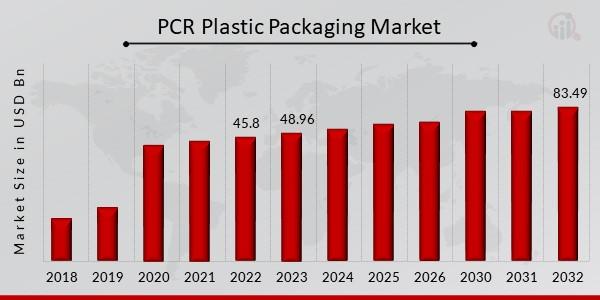In an era where environmental consciousness is paramount, the PCR Plastic Packaging Market has emerged as a beacon of hope for a more sustainable future. PCR plastic packaging involves the use of recycled plastic materials sourced from post-consumer waste, providing a second life to discarded plastics. This market has gained significant traction as businesses and consumers alike seek eco-friendly alternatives to traditional packaging solutions.

The PCR Plastic Packaging Market was valued US$ 4.8 Bn in 2022 and is expected to reach US$ 83.49 Bn by 2032, at a CAGR of 6.9% during the forecast period.
Growing Environmental Concerns:
The escalating environmental concerns associated with single-use plastics have spurred a global shift towards sustainable practices. The detrimental impact of plastic waste on ecosystems, marine life, and human health has prompted industries to reevaluate their packaging choices. PCR plastic packaging addresses these concerns by promoting the circular economy concept, where materials are recycled and reused, reducing the demand for virgin plastics.
Market Dynamics:
The PCR plastic packaging market is experiencing robust growth due to several factors. Governments and regulatory bodies worldwide are implementing stringent environmental regulations, pushing industries to adopt sustainable packaging solutions. Additionally, consumers are increasingly favoring products packaged in eco-friendly materials, influencing manufacturers and retailers to invest in PCR plastic packaging.
The demand for PCR plastic packaging is particularly pronounced in the food and beverage, personal care, and pharmaceutical industries. These sectors are recognizing the importance of adopting sustainable packaging to meet consumer expectations and adhere to regulatory standards. PCR plastic packaging offers a viable solution without compromising on the durability and functionality required for effective product protection.
Benefits of PCR Plastic Packaging:
Reduction in Carbon Footprint: PCR plastic packaging significantly reduces the carbon footprint associated with traditional packaging. By utilizing recycled materials, manufacturers contribute to lower energy consumption and greenhouse gas emissions, aligning with global efforts to combat climate change.
Resource Conservation: The production of PCR plastic requires fewer raw materials compared to virgin plastic. This not only conserves valuable resources but also minimizes the environmental impact associated with the extraction and processing of new materials.
Waste Reduction: PCR plastic packaging diverts plastic waste from landfills and oceans, providing a sustainable solution to the growing plastic pollution crisis. This contributes to the creation of a closed-loop system where plastic materials are continually recycled and reused.
Challenges and Innovations:
While the PCR plastic packaging market presents a promising avenue for sustainability, it is not without its challenges. One major obstacle is the inconsistency in the quality and availability of post-consumer recycled materials. To address this, industry players are investing in advanced technologies to enhance the sorting and recycling processes, ensuring a more reliable supply of high-quality PCR materials.
Moreover, innovations in material science are driving the development of bio-based and biodegradable plastics as alternatives to traditional and recycled plastics. These innovations aim to further reduce the environmental impact of packaging materials, offering additional choices for businesses committed to sustainability.
Conclusion:
The PCR plastic packaging market is a testament to the transformative power of sustainable practices in the packaging industry. As consumer awareness continues to grow and regulatory pressures intensify, businesses are compelled to adopt environmentally responsible solutions. PCR plastic packaging not only addresses these concerns but also fosters a circular economy, where plastics are repurposed to create a more sustainable and resilient future. As the market evolves, collaboration between industries, governments, and consumers will be crucial to maximizing the positive impact of PCR plastic packaging on the environment.
About Market Research Future:
Market Research Future (MRFR) is a global market research company that takes pride in its services, offering a complete and accurate analysis of diverse markets and consumers worldwide. Market Research Future has the distinguished objective of providing optimal quality research and granular research to clients. Our market research studies by products, services, technologies, applications, end users, and market players for global, regional, and country level market segments, enable our clients to see more, know more, and do more, which help answer your most important questions.
Contact:
Market Research Future (Part of Wantstats Research and Media Private Limited)
99 Hudson Street, 5Th Floor
New York, NY 10013
United States of America
+1 628 258 0071 (US)
+44 2035 002 764 (UK)
Email: sales@marketresearchfuture.com
Website: https://www.marketresearchfuture.com


